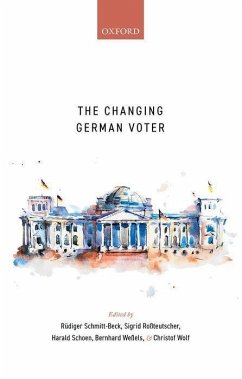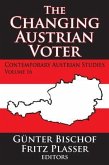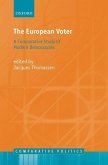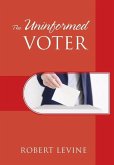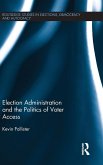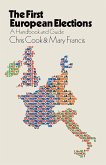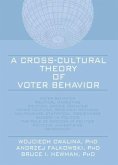The Changing German Voter
Herausgeber: Schmitt-Beck, Rüdiger; Wolf, Christof; Weßels, Bernhard; Schoen, Harald; Roßteutscher, Sigrid
The Changing German Voter
Herausgeber: Schmitt-Beck, Rüdiger; Wolf, Christof; Weßels, Bernhard; Schoen, Harald; Roßteutscher, Sigrid
- Gebundenes Buch
- Merkliste
- Auf die Merkliste
- Bewerten Bewerten
- Teilen
- Produkt teilen
- Produkterinnerung
- Produkterinnerung
The Changing German Voter examines the massive changes that German voters' behavior underwent during the second decade of the 21st century.
Andere Kunden interessierten sich auch für
![The Changing Austrian Voter The Changing Austrian Voter]() Cesare PaveseThe Changing Austrian Voter115,99 €
Cesare PaveseThe Changing Austrian Voter115,99 €![The Irish voter The Irish voter]() Michael MarshThe Irish voter29,99 €
Michael MarshThe Irish voter29,99 €![The European Voter The European Voter]() Jacques Thomassen (ed.)The European Voter241,99 €
Jacques Thomassen (ed.)The European Voter241,99 €![The Uninformed Voter The Uninformed Voter]() Robert LevineThe Uninformed Voter31,99 €
Robert LevineThe Uninformed Voter31,99 €![Election Administration and the Politics of Voter Access Election Administration and the Politics of Voter Access]() Kevin PallisterElection Administration and the Politics of Voter Access187,99 €
Kevin PallisterElection Administration and the Politics of Voter Access187,99 €![The First European Elections The First European Elections]() Chris CookThe First European Elections55,99 €
Chris CookThe First European Elections55,99 €![A Cross-Cultural Theory of Voter Behavior A Cross-Cultural Theory of Voter Behavior]() Wojciech CwalinaA Cross-Cultural Theory of Voter Behavior115,99 €
Wojciech CwalinaA Cross-Cultural Theory of Voter Behavior115,99 €-
-
-
The Changing German Voter examines the massive changes that German voters' behavior underwent during the second decade of the 21st century.
Hinweis: Dieser Artikel kann nur an eine deutsche Lieferadresse ausgeliefert werden.
Hinweis: Dieser Artikel kann nur an eine deutsche Lieferadresse ausgeliefert werden.
Produktdetails
- Produktdetails
- Verlag: Hurst & Co.
- Seitenzahl: 406
- Erscheinungstermin: 31. Oktober 2022
- Englisch
- Abmessung: 236mm x 159mm x 29mm
- Gewicht: 770g
- ISBN-13: 9780198847519
- ISBN-10: 0198847513
- Artikelnr.: 66146443
- Herstellerkennzeichnung
- Libri GmbH
- Europaallee 1
- 36244 Bad Hersfeld
- gpsr@libri.de
- Verlag: Hurst & Co.
- Seitenzahl: 406
- Erscheinungstermin: 31. Oktober 2022
- Englisch
- Abmessung: 236mm x 159mm x 29mm
- Gewicht: 770g
- ISBN-13: 9780198847519
- ISBN-10: 0198847513
- Artikelnr.: 66146443
- Herstellerkennzeichnung
- Libri GmbH
- Europaallee 1
- 36244 Bad Hersfeld
- gpsr@libri.de
Rüdiger Schmitt-Beck is a Professor of Political Science and Political Sociology at the University of Mannheim. Previously he held positions as a Professor of Political Communication at the University of Duisburg-Essen and as a Scientific Director at the Center for Survey Research and Methodology Mannheim (ZUMA). From 2007 to 2019 he was founding chairperson of the German Society for Electoral Research (DGfW). At the 2009, 2013 and 2017 German Federal Elections he has served as a co-Principal Investigator of the German national election study GLES (German Longitudinal Election Study). His research appeared in journals like the British Journal of Political Science, European Journal of Political Research, Political Communication, Electoral Studies and Party Politics, and with publishers like Oxford University Press and Routledge. Sigrid Roßteutscher is Professor at the department of Social Sciences, Goethe-University Frankfurt. Since 2009 she was a Co-Director of the German Longitudinal Election Study (GLES). At present, she is chairperson of the German Society for Electoral Research (DGfW). Her research interests focus on political participation, electoral behavior, turnout, political inequality, the role of religion in politics, value orientations, and social capital. She published in journals like the European Journal of Political Research, West European Politics, American Behavioral Scientist, European Sociological Review, Political Studies, and with publishers like Oxford University Press and Routledge. Harald Schoen is a Professor of Political Science at the University of Mannheim. He served as co-Principal Investigator of the German national election study GLES. His research focuses on political behavior and political psychology. It has been published in journals like the American Political Science Review, British Journal of Political Science, European Journal of Political Research, Journal of Communication, Political Behavior , Political Psychology, and Public Opinion Quarterly, and with publishers like Oxford University Press. Bernhard Weßels is Acting Director of the research unit 'Democracy and Democatization' at the WZB Berlin Social Science Center, and Professor of Political Science at Humboldt-Universität zu Berlin. He served as a member of the planning committee of the Comparative Study of Electoral Systems (CSES) for 14 years, directed the German CSES-Studies since 1998, and was a co-principal investigator of the German national election study GLES. He has published widely in the fields of political behavior, elections, and political representation. Christof Wolf is President of GESIS Leibniz-Institute for the Social Sciences, and Professor of Sociology at the University of Mannheim. He decisively supported the long-term institutionalization inter alia of the German Longitudinal Election Study and the European Social Survey in Germany; he also served on the boards of the International Social Survey Programme and the European Values Study. His research focuses on questions of survey methodology and social stratification. He edited several handbooks and published in journals, most recently in Public Opinion Quarterly, Comparative Population Studies and Journal of Marriage and Family.
* Part I: Introduction
* 1: Rüdiger Schmitt-Beck, Sigrid Roßteutscher, Harald Schoen, Bernhard
Weßels, and Christof Wolf: A New Era of Electoral Instability
* Part II: A Fragmenting Party System
* 2: Martin Elff and Sigrid Roßteutscher: All gone? Change and
Persistence in the Impact of Social Cleavages on Voting Behavior in
Germany since 1949
* 3: Bernhard Weßels: Leaving the Space - Opening the Gap? Electoral
Effects of Parties' and Voters' Repositioning
* 4: Lars-Christopher Stövsand, Melanie Dietz, Sigrid Roßteutscher, and
Philipp Scherer: Issue Salience and Vote Choice: A Cultural Turn?
* 5: Lea Gärtner, Harald Schoen, and Alexander Wuttke: Ties That No
Longer Bind? Effects and Responsiveness of Party Attachments in a
Period of Crises
* Part III: Challenged Voters
* 6: Aiko Wagner and Josephine Lichteblau: A New Player in the Game:
Changing Electoral Competition in Germany
* 7: Simon Ellerbrock: Partisan Agreement and Disagreement in Voters'
Discussant Networks: Contextual Constraints and Partisan Selectivity
in a Changing Electorate
* 8: Reinhold Melcher: (In-)Consistent Voting in the 2009, 2013 and
2017 German Federal Elections
* 9: Sascha Huber and Robert Welz: Dynamics of Coalition Preferences
and Vote Choices
* Part IV: Situational Voting
* 10: Agatha Kratz, Maria Preißinger, and Harald Schoen: Changing
Crises, Changing Votes? Problem Priorities, Party Competence, and
Electoral Behavior in Germany, 2009-2017
* 11: Nils Jungmann, Ina Bieber, Manuela Blumenberg, and Konstantin
Glinitzer: The Push and Pull of Political Leaders: Changing Candidate
Evaluations and Vote Switching between the 2013 and 2017 Federal
Elections
* 12: Jürgen Maier, Michaela Maier, and Thorsten Faas: Do Televised
Debates Affect Voting Behavior? Evidence from the 2009, 2013, and
2017 German Federal Elections
* 13: Rüdiger Schmitt-Beck and Alexander Staudt: Media Biases and Voter
Attitudes during the 2009, 2013, and 2017 Federal Election Campaigns
* 14: Julia Partheymüller and Richard Johnston: Plus ça Change?
Stability amid Volatility in German Campaigns
* Part V: Conclusion
* 15: Rüdiger Schmitt-Beck, Sigrid Roßteutscher, Harald Schoen,
Bernhard Weßels, and Christof Wolf: The Changing German Voter
* 1: Rüdiger Schmitt-Beck, Sigrid Roßteutscher, Harald Schoen, Bernhard
Weßels, and Christof Wolf: A New Era of Electoral Instability
* Part II: A Fragmenting Party System
* 2: Martin Elff and Sigrid Roßteutscher: All gone? Change and
Persistence in the Impact of Social Cleavages on Voting Behavior in
Germany since 1949
* 3: Bernhard Weßels: Leaving the Space - Opening the Gap? Electoral
Effects of Parties' and Voters' Repositioning
* 4: Lars-Christopher Stövsand, Melanie Dietz, Sigrid Roßteutscher, and
Philipp Scherer: Issue Salience and Vote Choice: A Cultural Turn?
* 5: Lea Gärtner, Harald Schoen, and Alexander Wuttke: Ties That No
Longer Bind? Effects and Responsiveness of Party Attachments in a
Period of Crises
* Part III: Challenged Voters
* 6: Aiko Wagner and Josephine Lichteblau: A New Player in the Game:
Changing Electoral Competition in Germany
* 7: Simon Ellerbrock: Partisan Agreement and Disagreement in Voters'
Discussant Networks: Contextual Constraints and Partisan Selectivity
in a Changing Electorate
* 8: Reinhold Melcher: (In-)Consistent Voting in the 2009, 2013 and
2017 German Federal Elections
* 9: Sascha Huber and Robert Welz: Dynamics of Coalition Preferences
and Vote Choices
* Part IV: Situational Voting
* 10: Agatha Kratz, Maria Preißinger, and Harald Schoen: Changing
Crises, Changing Votes? Problem Priorities, Party Competence, and
Electoral Behavior in Germany, 2009-2017
* 11: Nils Jungmann, Ina Bieber, Manuela Blumenberg, and Konstantin
Glinitzer: The Push and Pull of Political Leaders: Changing Candidate
Evaluations and Vote Switching between the 2013 and 2017 Federal
Elections
* 12: Jürgen Maier, Michaela Maier, and Thorsten Faas: Do Televised
Debates Affect Voting Behavior? Evidence from the 2009, 2013, and
2017 German Federal Elections
* 13: Rüdiger Schmitt-Beck and Alexander Staudt: Media Biases and Voter
Attitudes during the 2009, 2013, and 2017 Federal Election Campaigns
* 14: Julia Partheymüller and Richard Johnston: Plus ça Change?
Stability amid Volatility in German Campaigns
* Part V: Conclusion
* 15: Rüdiger Schmitt-Beck, Sigrid Roßteutscher, Harald Schoen,
Bernhard Weßels, and Christof Wolf: The Changing German Voter
* Part I: Introduction
* 1: Rüdiger Schmitt-Beck, Sigrid Roßteutscher, Harald Schoen, Bernhard
Weßels, and Christof Wolf: A New Era of Electoral Instability
* Part II: A Fragmenting Party System
* 2: Martin Elff and Sigrid Roßteutscher: All gone? Change and
Persistence in the Impact of Social Cleavages on Voting Behavior in
Germany since 1949
* 3: Bernhard Weßels: Leaving the Space - Opening the Gap? Electoral
Effects of Parties' and Voters' Repositioning
* 4: Lars-Christopher Stövsand, Melanie Dietz, Sigrid Roßteutscher, and
Philipp Scherer: Issue Salience and Vote Choice: A Cultural Turn?
* 5: Lea Gärtner, Harald Schoen, and Alexander Wuttke: Ties That No
Longer Bind? Effects and Responsiveness of Party Attachments in a
Period of Crises
* Part III: Challenged Voters
* 6: Aiko Wagner and Josephine Lichteblau: A New Player in the Game:
Changing Electoral Competition in Germany
* 7: Simon Ellerbrock: Partisan Agreement and Disagreement in Voters'
Discussant Networks: Contextual Constraints and Partisan Selectivity
in a Changing Electorate
* 8: Reinhold Melcher: (In-)Consistent Voting in the 2009, 2013 and
2017 German Federal Elections
* 9: Sascha Huber and Robert Welz: Dynamics of Coalition Preferences
and Vote Choices
* Part IV: Situational Voting
* 10: Agatha Kratz, Maria Preißinger, and Harald Schoen: Changing
Crises, Changing Votes? Problem Priorities, Party Competence, and
Electoral Behavior in Germany, 2009-2017
* 11: Nils Jungmann, Ina Bieber, Manuela Blumenberg, and Konstantin
Glinitzer: The Push and Pull of Political Leaders: Changing Candidate
Evaluations and Vote Switching between the 2013 and 2017 Federal
Elections
* 12: Jürgen Maier, Michaela Maier, and Thorsten Faas: Do Televised
Debates Affect Voting Behavior? Evidence from the 2009, 2013, and
2017 German Federal Elections
* 13: Rüdiger Schmitt-Beck and Alexander Staudt: Media Biases and Voter
Attitudes during the 2009, 2013, and 2017 Federal Election Campaigns
* 14: Julia Partheymüller and Richard Johnston: Plus ça Change?
Stability amid Volatility in German Campaigns
* Part V: Conclusion
* 15: Rüdiger Schmitt-Beck, Sigrid Roßteutscher, Harald Schoen,
Bernhard Weßels, and Christof Wolf: The Changing German Voter
* 1: Rüdiger Schmitt-Beck, Sigrid Roßteutscher, Harald Schoen, Bernhard
Weßels, and Christof Wolf: A New Era of Electoral Instability
* Part II: A Fragmenting Party System
* 2: Martin Elff and Sigrid Roßteutscher: All gone? Change and
Persistence in the Impact of Social Cleavages on Voting Behavior in
Germany since 1949
* 3: Bernhard Weßels: Leaving the Space - Opening the Gap? Electoral
Effects of Parties' and Voters' Repositioning
* 4: Lars-Christopher Stövsand, Melanie Dietz, Sigrid Roßteutscher, and
Philipp Scherer: Issue Salience and Vote Choice: A Cultural Turn?
* 5: Lea Gärtner, Harald Schoen, and Alexander Wuttke: Ties That No
Longer Bind? Effects and Responsiveness of Party Attachments in a
Period of Crises
* Part III: Challenged Voters
* 6: Aiko Wagner and Josephine Lichteblau: A New Player in the Game:
Changing Electoral Competition in Germany
* 7: Simon Ellerbrock: Partisan Agreement and Disagreement in Voters'
Discussant Networks: Contextual Constraints and Partisan Selectivity
in a Changing Electorate
* 8: Reinhold Melcher: (In-)Consistent Voting in the 2009, 2013 and
2017 German Federal Elections
* 9: Sascha Huber and Robert Welz: Dynamics of Coalition Preferences
and Vote Choices
* Part IV: Situational Voting
* 10: Agatha Kratz, Maria Preißinger, and Harald Schoen: Changing
Crises, Changing Votes? Problem Priorities, Party Competence, and
Electoral Behavior in Germany, 2009-2017
* 11: Nils Jungmann, Ina Bieber, Manuela Blumenberg, and Konstantin
Glinitzer: The Push and Pull of Political Leaders: Changing Candidate
Evaluations and Vote Switching between the 2013 and 2017 Federal
Elections
* 12: Jürgen Maier, Michaela Maier, and Thorsten Faas: Do Televised
Debates Affect Voting Behavior? Evidence from the 2009, 2013, and
2017 German Federal Elections
* 13: Rüdiger Schmitt-Beck and Alexander Staudt: Media Biases and Voter
Attitudes during the 2009, 2013, and 2017 Federal Election Campaigns
* 14: Julia Partheymüller and Richard Johnston: Plus ça Change?
Stability amid Volatility in German Campaigns
* Part V: Conclusion
* 15: Rüdiger Schmitt-Beck, Sigrid Roßteutscher, Harald Schoen,
Bernhard Weßels, and Christof Wolf: The Changing German Voter

